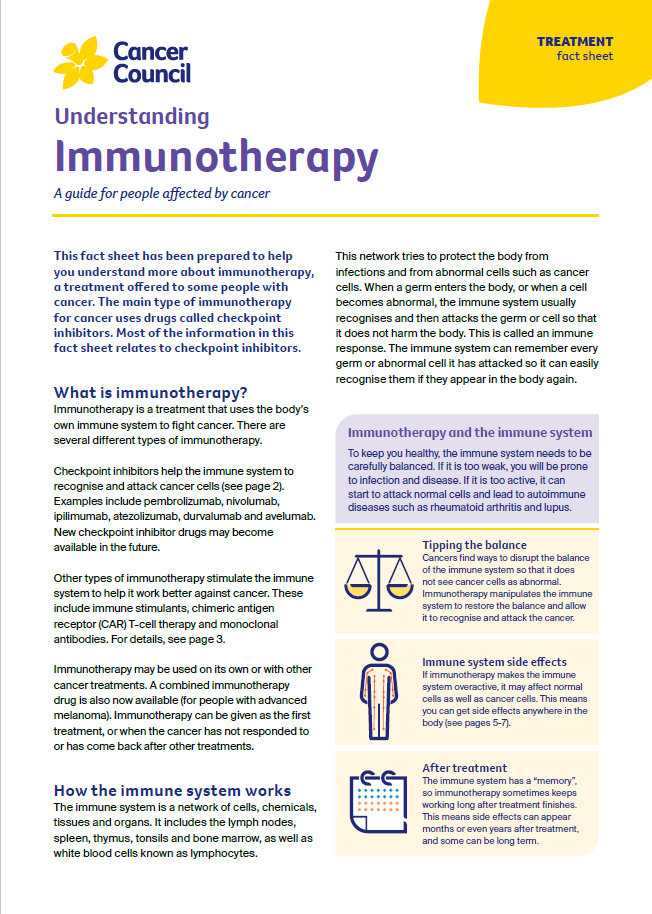- Home
- Cancer of the uterus
- Treatment
- Immunotherapy and targeted therapy
Immunotherapy and targeted therapy
Some immunotherapy and targeted therapy drugs are being used for people with endometrial cancer that has come back or not responded to treatment.
Learn more about:
Immunotherapy
Immunotherapy is a type of drug treatment that uses the body’s own immune system to fight cancer.
An immunotherapy drug called pembrolizumab (used in combination with the targeted therapy drug lenvatinib, see below) may be an option for some people with endometrial cancer that has spread (metastatic disease) or is no longer responding to treatment with chemotherapy.
Side effects of immunotherapy
Common side effects include:
- fatigue
- being or feeling sick (nausea)
- skin rash and itching
- joint pain
- diarrhoea
- dry eyes
- joint pain.
Rarely, immunotherapy can affect the lungs, bowel or thyroid gland and these side effects can sometimes be life-threatening. It’s important to let your treatment team know about any new or worsening side effects during or after treatment. Don’t try to treat side effects yourself.
For more on this, see Immunotherapy.
Targeted therapy
Targeted therapy is a drug treatment that attacks specific features of cancer cells to stop the cancer growing and spreading.
A targeted therapy drug called lenvatinib may be used to treat endometrial cancer that has spread or come back, or to boost the effectiveness of immunotherapy.
Side effects of targeted therapy
Common side effects include:
- fatigue
- being or feeling sick (nausea)
- diarrhoea
- constipation
- sore mouth
- blood pressure changes
- appetite loss
- bleeding and bruising
- skin problems
- joint aches
- headache.
Less common side effects, such as heart problems and stroke, can also occur. It’s important to tell your doctor about any new or worsening side effects.
For more on this, see Targeted therapy.
Ask your doctor about other recent developments in drugs for cancer of the uterus and whether a clinical trial may be an option for you.
→ READ MORE: Palliative treatment
Video: What is drug therapy?
Watch this short video to learn more about drug therapies, including targeted therapy and immunotherapy.
Podcast: Immunotherapy and Targeted Therapy
Listen to more episodes from our podcast for people affected by cancer
More resources
A/Prof Orla McNally, Consultant Gynaecological Oncologist, Director Oncology/Dysplasia, Royal Women’s Hospital, Honorary Clinical Associate Professor, University of Melbourne, and Director of Gynaecology Tumour Stream, Victorian Comprehensive Cancer Centre, VIC; A/Prof Yoland Antill, Medical Oncologist, Peninsula Health, Parkville Familial Cancer Centre, Cabrini Health and Monash University, VIC; Grace Guerzoni, Consumer; Zeina Hayes, 13 11 20 Consultant, Cancer Council Victoria; Bronwyn Jennings, Gynaecology Oncology Clinical Nurse Consultant, Mater Hospital Brisbane, QLD; A/Prof Christopher Milross, Director of Mission and Radiation Oncologist, Chris O’Brien Lifehouse, NSW; Mariad O’Gorman, Clinical Psychologist, Liverpool Cancer Therapy Centre and Bankstown Cancer Centre, NSW.
View the Cancer Council NSW editorial policy.
View all publications or call 13 11 20 for free printed copies.
Need to talk?
Support services
Exercise and cancer
Learn exercises that can help you with side effects, speeding up recovery, and improving your quality of life
Online Community
Check out this supportive online community for people affected by cancer
Cancer information
How targeted therapy works
Each drug acts on a specific molecular target within or on the surface of cancer cells (for example, a gene or protein). Learn more.
Making cancer treatment decisions
Decision-making steps, consent and second opinions

